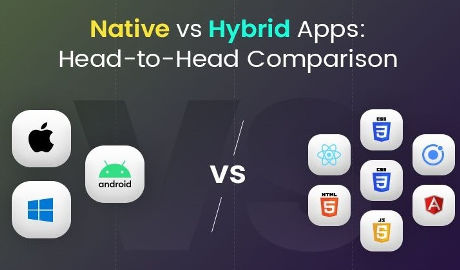
In the fast-paced world of mobile technology, businesses are constantly seeking innovative ways to connect with their customers. Mobile applications have become indispensable tools for meeting the day-to-day needs of users, whether it's for banking, shopping, entertainment, or productivity. With the exponential growth in mobile app usage, the mobile app development industry is booming, with an estimated 299 billion app downloads projected for the near future. However, amidst this proliferation of mobile apps, businesses face a critical decision: whether to develop a native app tailored for a specific platform or opt for the versatility of hybrid app development.
In this comprehensive guide, we will delve deep into the native vs hybrid app development debate, exploring the differences between these two approaches and providing insights to help businesses make informed decisions.
Understanding Native Apps:
Native app development involves creating applications using platform-specific programming languages and tools. For example, Android apps are typically developed using Java or Kotlin, while iOS apps are built using Swift or Objective-C. Native apps are designed to run exclusively on a particular operating system (OS), such as Android or iOS, and leverage the full capabilities of the device. Examples of popular native apps include WhatsApp, Spotify, and Pokémon Go.
Advantages of Native Apps:
1. Familiar User Experience: Native apps offer a familiar look and feel, providing users with a seamless and intuitive experience that aligns with platform guidelines.
2. Optimized Performance: Due to their close integration with the underlying OS, native apps typically deliver superior performance, with faster load times and smoother animations.
3. Access to Device Features: Native apps can leverage the device's hardware features, such as GPS, camera, and accelerometer, to deliver rich and immersive experiences.
Disadvantages of Native Apps:
1. Higher Development Cost: Developing native apps for multiple platforms requires separate development efforts, leading to higher costs compared to hybrid app development.
2. Platform-Specific Updates: Updating features across multiple platforms can be time-consuming and cumbersome, as changes need to be implemented separately for each OS.
3. Longer Download Time: Users may experience longer download times for native apps, as they need to go through the app store installation process.
Exploring Hybrid Apps:
Hybrid app development combines elements of web and native app development. These apps are essentially web applications wrapped in a native container, allowing them to be deployed across multiple platforms. Hybrid apps are built using web technologies such as HTML, CSS, and JavaScript, and can access native device features through plugins. Examples of hybrid apps include Uber, Instagram, and Twitter.
Advantages of Hybrid Apps:
1. Cost-Effectiveness: Hybrid apps offer cost savings as they can be developed and maintained using a single codebase for multiple platforms.
2. Cross-Platform Compatibility: With hybrid apps, businesses can reach a broader audience by deploying their app on multiple platforms, including Android and iOS.
3. Faster Development Time: Hybrid app development typically requires less time and effort compared to native app development, making it ideal for rapid prototyping and testing.
Disadvantages of Hybrid Apps:
1. Performance Limitations: Hybrid apps may not perform as well as native apps, especially for graphics-intensive tasks or complex animations.
2. Varied User Experience: The user experience of hybrid apps may vary across different devices and operating systems, leading to inconsistencies in app performance.
3. Dependency on Native Plugins: Accessing certain device features may require the use of native plugins, adding complexity to the development process.
When to Choose Native Apps:
High Performance Needs: If your app requires high performance, intricate animations, or extensive use of device features, native app development is the way to go.
Platform-Specific Experience: If providing a consistent user experience aligned with platform guidelines is crucial for your app, native development is preferred.
Long-Term Scalability: For apps with long-term scalability and offline capabilities, native development offers better control and optimization.
When to Choose Hybrid Apps:
Rapid Prototyping: If you need to quickly test and validate your app concept before investing in full-scale development, hybrid app development offers a faster time-to-market.
Cost-Effectiveness: For businesses with budget constraints or limited resources, hybrid app development provides a cost-effective solution by leveraging a single codebase.
Cross-Platform Compatibility: If reaching a broad audience across multiple platforms is a priority, hybrid apps allow you to deploy your app on both Android and iOS with minimal effort.
Conclusion: The choice between native and hybrid app development depends on various factors such as performance needs, budget constraints, and target audience. By understanding the differences and considering your specific requirements, you can make an informed decision that aligns with your business goals. Whether you choose native or hybrid development, partnering with a reputable mobile app development company like Aurorae-Labs can help ensure the success of your app project. With their expertise in building innovative and user-friendly mobile apps, Aurorae-Labs can turn your app idea into reality. Visit their website https://www.auroraelabs.com/ to learn more about their services and capabilities.


